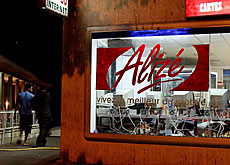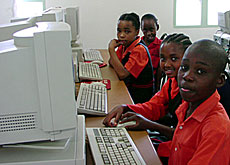Pre-summit talks fall on deaf ears

The final preparatory meeting for the World Summit on the Information Society (WSIS) in Tunis has drawn to an unresolved close in the Swiss city of Geneva.
The so-called PrepCom-3 was marked by accusations of press censorship in Tunisia and the United States’ refusal to loosen its grip on managing the internet.
However, delegates on Friday agreed to meet again three days before the summit on November 16-18.
“The past ten days haven’t been as successful as I hoped,” Marc Furrer, president of the Federal Communications Commission and head of the Swiss delegation to the WSIS, told swissinfo.
“It was not a big surprise that we didn’t make more progress on internet governance, but what worries me more is that we didn’t even have a genuine political negotiation with the Americans about the main points.”
Furrer is confident that all parties will get down to high-level discussions in Tunisia, “but why go through all these PrepComs if you only get to the meat three days before the summit?”.
Intransigence.com
The summit aims to approve a plan for extending the use of the internet and other forms of advanced communications in order to help poorer countries achieve United Nations development goals by 2015.
The European Union insisted on Friday that governments and the private sector must share the responsibility of policing the internet.
However the US refused to relinquish its role as the internet’s principal policeman, rejecting calls for an international body to take over. It currently manages the global information system through a partnership with California-based company ICANN.
Later on Friday, the United Nations’ International Telecommunications Union (ITU) said it was ready to take over governance of the internet from the United States.
“We could do it if we were asked to,” the head of ITU, Yoshio Utsumi, told a news conference. The UN agency’s experience in communications, its structure and its cooperation with private and public bodies made it best-placed to take on the role, he said.
Washington has made clear it would oppose any such move. “We will not agree to the UN taking over management of the internet,” said David Gross, the US coordinator for international communications and information policy. “It’s not a negotiating issue, this is a matter of national policy.”
Furrer was philosophical on Washington’s apparent refusal to negotiate. “Of course the discussion will go on – the internet is a reality. I just hope that we find some common ground in Tunis – not a lot, but some.”
Furrer said the problem was that the US position was already known, which left little room to manoeuvre for US negotiators.
“Washington is checking them rather closely,” he added.
Press freedom
The other main sticking point was the issue of press freedom in Tunisia.
On Wednesday Tunisian authorities described as “biased and inaccurate” a report issued earlier in the week that accused them of restricting the press and harassing journalists.
Responding to the report by the Tunisian Monitoring Group, which comprises 14 media non-governmental organisations (NGOs), the government said Tunisia had a “free and pluralistic” press and that there was no media censorship.
The report said the government has blocked access to websites belonging to Reporters Without Borders, other human-rights watchdogs and the independent press, while police monitor emails and internet cafés.
Furrer believes the Tunisian government has got the message that this behaviour is not acceptable and that it must give full access to civil society.
“It is obvious that opposition groups will use the opportunity to express themselves. The president of Tunisia has to accept that – otherwise he should never have gone for an information-society summit,” he said.
“This is a summit in Tunisia – it shouldn’t be a summit on Tunisia.”
swissinfo, Thomas Stephens
PrepCom-3 has ended but disagreements over main issues mean another session has had to be lined up three days before the summit proper.
The US said internet governance was “non-negotiable”.
The Tunisian authorities said claims of press censorship were “biased and inaccurate”.
The third meeting of the Preparatory Committee (PrepCom-3) of the Tunis phase of the WSIS was held in Geneva, from September 19-30, 2005.
The WSIS is due to be held in the Tunisian capital of Tunis from November 16-18.
The aim of the summit is to bridge the digital divide between rich and poor nations, as well as tackle issues such as internet governance.

In compliance with the JTI standards
More: SWI swissinfo.ch certified by the Journalism Trust Initiative



You can find an overview of ongoing debates with our journalists here. Please join us!
If you want to start a conversation about a topic raised in this article or want to report factual errors, email us at english@swissinfo.ch.